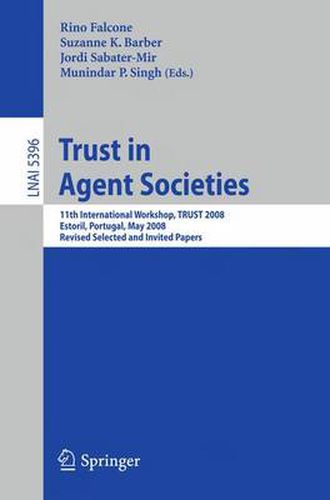Readings Newsletter
Become a Readings Member to make your shopping experience even easier.
Sign in or sign up for free!
You’re not far away from qualifying for FREE standard shipping within Australia
You’ve qualified for FREE standard shipping within Australia
The cart is loading…






This title is printed to order. This book may have been self-published. If so, we cannot guarantee the quality of the content. In the main most books will have gone through the editing process however some may not. We therefore suggest that you be aware of this before ordering this book. If in doubt check either the author or publisher’s details as we are unable to accept any returns unless they are faulty. Please contact us if you have any questions.
This special issue is the result of the selection and re-submission of advanced and revised versions of papers from the workshop on Trust in Agent Societies (11th edition), held in Estoril (Portugal) on May 10, 2008 as part of the Autonomous Agents and Multi-Agent Systems 2008 Conference (AAMAS 2008), and organized by Rino Falcone, Suzanne Barber, Jordi Sabater-Mir, and Munindar Singh. The aim of the workshop was to bring together researchers from different fields (artificial intelligence, multi-agent systems, cognitive science, game theory, and social and organizational sciences) that could contribute to a better understanding of trust and reputation in agent societies. The workshop scope included theoretical results as well their applications in human-computer interaction and electronic commerce. It was constituted by a main session integrated with two others: the first on the formal models of trust, and the second on reputation models. In this volume we present papers from the three workshop sessions: the main s- sion with papers on theoretical and applicative aspects of trust (from a engineering, cognitive, computational, sociological point of view); the formal model session with works in the field of applied logic and applied mathematics; the reputation models session with papers that specifically address models of reputation systems, theo- driven and empirically backed-up guidelines for designing reputation technologies, and analysis and discussion of existing reputation systems.
$9.00 standard shipping within Australia
FREE standard shipping within Australia for orders over $100.00
Express & International shipping calculated at checkout
This title is printed to order. This book may have been self-published. If so, we cannot guarantee the quality of the content. In the main most books will have gone through the editing process however some may not. We therefore suggest that you be aware of this before ordering this book. If in doubt check either the author or publisher’s details as we are unable to accept any returns unless they are faulty. Please contact us if you have any questions.
This special issue is the result of the selection and re-submission of advanced and revised versions of papers from the workshop on Trust in Agent Societies (11th edition), held in Estoril (Portugal) on May 10, 2008 as part of the Autonomous Agents and Multi-Agent Systems 2008 Conference (AAMAS 2008), and organized by Rino Falcone, Suzanne Barber, Jordi Sabater-Mir, and Munindar Singh. The aim of the workshop was to bring together researchers from different fields (artificial intelligence, multi-agent systems, cognitive science, game theory, and social and organizational sciences) that could contribute to a better understanding of trust and reputation in agent societies. The workshop scope included theoretical results as well their applications in human-computer interaction and electronic commerce. It was constituted by a main session integrated with two others: the first on the formal models of trust, and the second on reputation models. In this volume we present papers from the three workshop sessions: the main s- sion with papers on theoretical and applicative aspects of trust (from a engineering, cognitive, computational, sociological point of view); the formal model session with works in the field of applied logic and applied mathematics; the reputation models session with papers that specifically address models of reputation systems, theo- driven and empirically backed-up guidelines for designing reputation technologies, and analysis and discussion of existing reputation systems.